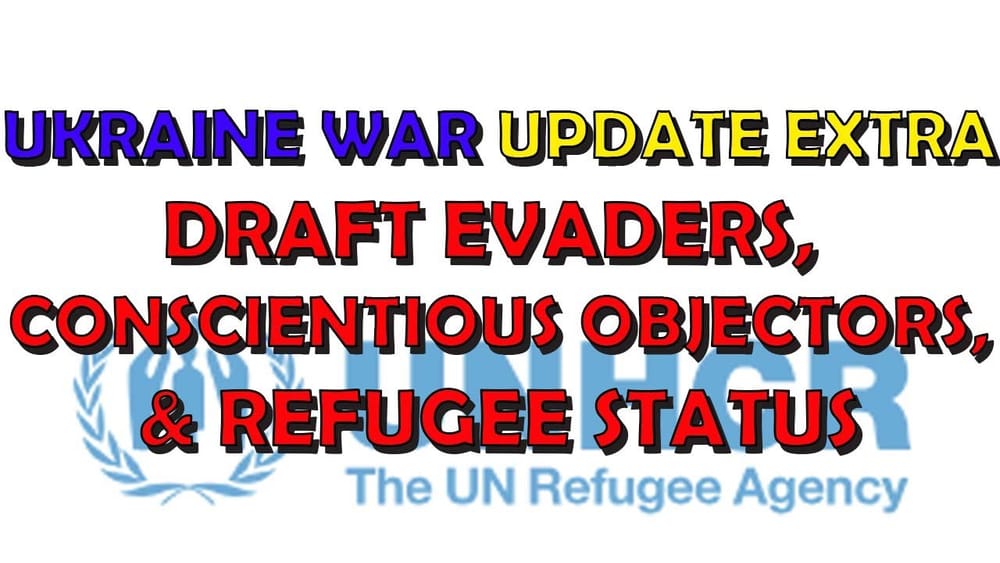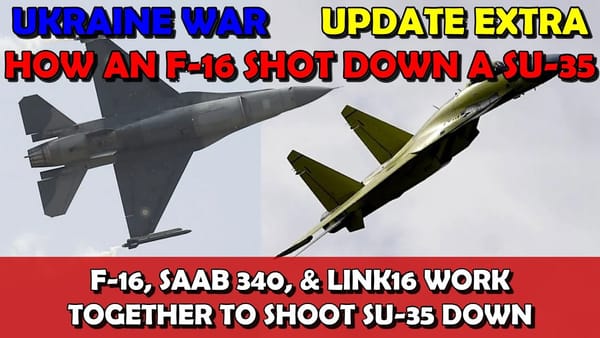Ukraine War Upd. EXTRA: Draft Evaders, Conscientious Objectors, & Refugee Status
Table of Contents 📖
"The longer-term moral and political as well as legal credibility of combining opposition to Russian conduct in its conflict with Ukraine with effective victimization of human beings trying to avoid contributing to Russia's efforts is minimal"
Hello Team
🎦 00:00-00:15⏩
Jonathan welcomes viewers to an "extra nuggets and tidbits" Ukraine War Update extra video on the subject of draft evasion. This was prompted by a comment/question from a viewer called Bertold.
Return to top⤴️
European nations split on Ukrainian draft evaders
🎦 00:15-01:51⏩
Jonathan explains that there's no consensus in Europe on what to do with Ukrainian draft evaders. Some nations say that they will return them to Ukraine, some say that they can stay. Whether they would be entitled to refugee status is unclear.
Return to top⤴️
Conscientious Objectors vs. Draft Evaders
🎦 01:51-04:45⏩
Jonathan addresses a comment by viewer "Bertold" who argues that sending conscientious objectors back to Ukraine and denying them asylum is straightforward and "not a moral minefield". Jonathan believes that this conflates conscientious objectors with draft evaders. Conscientious objectors refuse military service based on deeply held beliefs (religious, moral, political), whereas draft evaders are primarily motivated by self-preservation. He uses the example of someone leaving Ukraine to avoid mobilisation, even though they support Ukraine's cause. He questions whether seeking refuge solely to evade the draft, even in a high-risk conflict, is a valid basis for refugee status, drawing parallels to someone refusing a risky job like being a pilot.
Return to top⤴️
Geneva Convention on Refugees: Subjective Rights and Case-by-Case Examination
🎦 04:45-07:48⏩
Jonathan challenges Bertold's assertion that the Geneva Convention offers a clear-cut answer. He highlights that claiming asylum is a subjective right, requiring case-by-case assessment. While a Ukrainian man fearing for his life under Russian fire might cite this, Jonathan argues it doesn't guarantee refugee status. He takes issue with Bertold's claim that most male refugees from the Middle East in Europe are there due to this right and their fear of being forced to kill or be killed, asserting that Bertold is misrepresenting Jonathan's own stance as being in favour of sending them back. Jonathan clarifies that he doesn't hold a definitive view on this complex issue and would advocate for a thorough examination considering all legal and philosophical angles.
Return to top⤴️
UNHCR's stance on Draft Evasion and Refugee Status
🎦 07:48-17:36⏩
Jonathan delves into the UNHCR's position on draft evasion as grounds for refugee status.
- Fear of Punishment Isn't Enough: Fear of prosecution or punishment for draft evasion, on its own, doesn't automatically qualify as "well-founded fear of persecution." A standard prison sentence or fine wouldn't meet the threshold.
* Conscientious Objection Can Be Grounds: There are situations where refusing military service based on genuine political, religious, or moral convictions can justify refugee status. However, this requires more than simply declaring oneself a conscientious objector; the applicant must demonstrate a history of these beliefs and the likelihood of persecution for them. * Not All Convictions Qualify: Even genuinely held convictions might not suffice. The UNHCR emphasizes the need for a strong, credible case. * International Condemnation Strengthens the Case: When the international community condemns the actions a draft evader would be complicit in, it strengthens their claim. Jonathan argues this is more applicable to Russians evading a war deemed illegal than to Ukrainians. * Credibility and Likelihood of Persecution: A draft evader's claim hinges on the credibility of their convictions and the likelihood of facing disproportionate punishment, potentially rising to the level of persecution. This involves demonstrating a real risk of severe harm.
Return to top⤴️
UK Regulations on Military Service and Asylum in Ukraine
🎦 17:36-24:29⏩
Jonathan shifts focus to UK regulations on military service and asylum, specifically regarding Ukraine, citing a June 2022 policy document. * National Service is a Sovereign Right: The UK acknowledges a nation's right to enforce compulsory military service, asserting that punishment for draft evasion, including imprisonment, is not inherently persecution as long as it's proportionate. * Draft Evasion Doesn't Exclude Refugee Status: While not automatic, draft evaders can still qualify for refugee status if they meet other criteria. * When Punishment Amounts to Persecution: The document outlines three scenarios where punishment for draft evasion might justify asylum:
- 1
- 2
- 3
Exemptions, Mobilisation and Risk under UK Law
🎦 24:29-28:52⏩
Jonathan continues examining the UK's stance on Ukrainian draft evasion.
- Those Exempt are Unlikely to Qualify: Individuals eligible for exemption from service, like those with medical conditions or certain professions, are unlikely to have a well-founded fear of persecution.
- Mobilisation and Territorial Defence: The document highlights the mobilisation of reservists for territorial defence, noting their potential deployment to the front lines.
- Fear of Death Isn't Sufficient: Critically, the UK clarifies that fear of being killed in combat, while understandable, is not in itself grounds for asylum. This is because international law allows for derogation from the right to life during lawful acts of war.
EU Approaches and Divergent Practices
🎦 28:52-34:30⏩
Jonathan contrasts UK regulations with EU approaches. * EU Directive 2011-95: The EU explicitly addresses military service evasion. It defines "acts of persecution" to include punishment for refusing to participate in conflicts where service would likely involve war crimes, crimes against humanity, or violations of UN principles. * Divergent Practices Among States: Despite the directive, EU countries have interpreted and applied it differently. This is evident in the varying recognition rates of Eritrean asylum seekers fleeing conscription, ranging from near zero to over 50%. * Case Law Examples: Jonathan cites two German court cases:
- An Assyrian man (EZ) fleeing conscription in Syria was initially granted subsidiary protection, not full refugee status. This was appealed, and the court ultimately reasoned that serving in the Syrian army, known for systematic war crimes, would likely make him complicit, potentially justifying asylum.
- An American helicopter mechanic (Andre Shepard), AWOL in Germany, claimed conscientious objection to the Iraq War. Germany rejected his asylum bid. The CJEU clarified that demonstrating a "reasonable likelihood" of being complicit in war crimes through service is sufficient, even without proof of past crimes by their unit or a formal ICC ruling.
Jonathan uses these examples to underscore the complexity of the issue and the challenges in establishing a universal standard. He argues that while the Syrian army's actions might justify EZ's claim, the situation is less clear-cut for Ukrainians as their military isn't accused of the same systematic atrocities.
Return to top⤴️
Russian Draft Evaders Have a Stronger Case
🎦 34:30-38:52⏩
Jonathan argues that Russian draft evaders may have a stronger case for asylum than Ukrainians due to: * Conscientious Objection: The nature of the conflict and potential for being forced to commit atrocities make it easier for Russians to argue conscientious objection. * Risk of Persecution: Russians face a higher likelihood of persecution for draft evasion, including harsh prison sentences, torture, or extrajudicial killings. This stark reality makes their claims more compelling under international law.
Return to top⤴️
Navigating the Moral Minefield: Jonathan's Concluding Thoughts
🎦 38:52-44:20⏩
Jonathan summarizes his analysis:
- Two Main Categories: The issue revolves around two types of individuals: conscientious objectors and those seeking to avoid risk.
- Conscientious Objectors Need to Demonstrate Genuineness: Both Russians and Ukrainians can claim conscientious objection but must prove the genuineness of their beliefs, their consistency over time, and the likelihood of persecution based on those beliefs. He acknowledges that Ukrainians face a higher bar because the argument of likely persecution within Ukraine is weaker.
- Risk Avoidance Is Shaky Ground: Claiming asylum solely to avoid the inherent risks of war, without a strong conscientious objector argument, has a much weaker legal basis. He acknowledges the emotional toll and difficulty of war, but maintains that personal fear, while understandable, isn't automatically grounds for refugee status under current interpretations of international law.
Jonathan reiterates that this issue is a "moral minefield" with no easy answers, highlighting the need for nuanced, case-by-case assessments. He acknowledges that while he understands the fear motivating draft evasion, international refugee law focuses on more than just personal risk.
Return to top⤴️
Wrap up
🎦 44:20-44:20⏩
Jonathan thanks Bertold for prompting this complex discussion and invites further insights from viewers, emphasizing the importance of continuous learning and open dialogue.
Return to top⤴️



